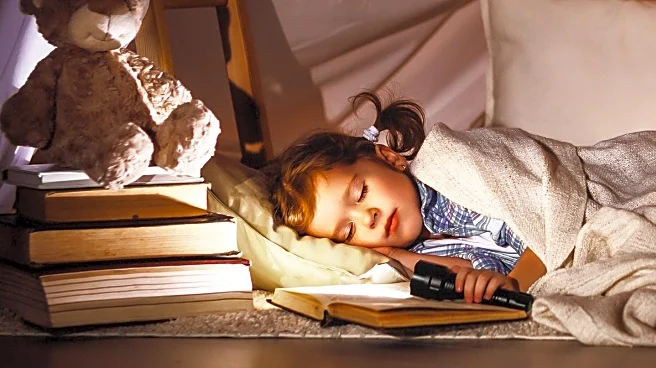What's Happening?
A study conducted by Brown University has revealed that children are getting less sleep than their parents perceive, and less than the recommended amount. The research, published in Frontiers in Pediatrics, involved tracking the sleep patterns of 102 elementary school children using wrist-worn accelerometers. The study found that children aged 6 to 12 should ideally sleep between nine and 12 hours per night, as per the American Academy of Pediatrics. However, the data showed that children were averaging only eight hours and 20 minutes of sleep, while parents believed their children were sleeping over nine and a half hours. The study also highlighted ethnic disparities, with Latino children averaging slightly over eight hours of sleep compared to eight and a half hours for non-Latino children. Only 4.4% of Latino participants met the sleep guidelines, compared to 22% of non-Latino participants.
Why It's Important?
The findings of this study are significant as they highlight a gap in parental awareness regarding their children's sleep patterns, which can have implications for children's health and development. Adequate sleep is crucial for cognitive function, emotional regulation, and overall well-being in children. The study suggests that cultural factors, such as later bedtimes and co-sleeping, may influence sleep behaviors and parental perceptions, particularly in Latino households. This research underscores the need for improved communication and education about sleep health among families, which could lead to better sleep practices and outcomes for children. The study also points to the limitations of current sleep tracking technologies, which may not accurately capture sleep patterns, further complicating parental understanding.
What's Next?
To address the issues identified in the study, parents are encouraged to adopt consistent sleep routines, promote physical activity, and limit screen time before bed. These measures could help improve children's sleep quality and duration. Additionally, the study suggests that further research and development of more accurate sleep tracking technologies could aid in better understanding and managing children's sleep health. Policymakers and healthcare providers might also consider developing targeted interventions and educational programs to raise awareness about the importance of sleep and to address cultural factors that may affect sleep behaviors.
Beyond the Headlines
The study's findings could have broader implications for public health policy and education systems, as sleep deprivation in children can affect academic performance and social interactions. There is also a potential for long-term health consequences if sleep issues are not addressed early. The research highlights the importance of culturally sensitive approaches to health education, recognizing that different communities may have unique practices and challenges related to sleep. This could lead to more tailored and effective strategies for improving sleep health across diverse populations.









